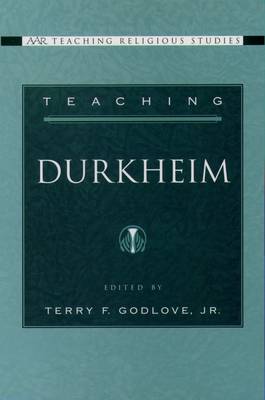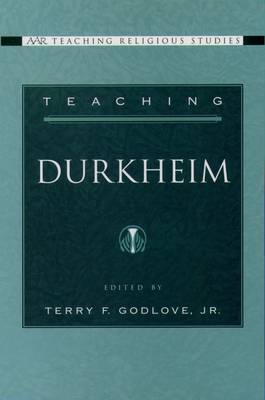
Door een staking bij bpost kan je online bestelling op dit moment iets langer onderweg zijn dan voorzien. Dringend iets nodig? Onze winkels ontvangen jou met open armen!
- Afhalen na 1 uur in een winkel met voorraad
- Gratis thuislevering in België vanaf € 30
- Ruim aanbod met 7 miljoen producten
Door een staking bij bpost kan je online bestelling op dit moment iets langer onderweg zijn dan voorzien. Dringend iets nodig? Onze winkels ontvangen jou met open armen!
- Afhalen na 1 uur in een winkel met voorraad
- Gratis thuislevering in België vanaf € 30
- Ruim aanbod met 7 miljoen producten
Zoeken
Omschrijving
Emile Durkheim's work on religion occupies a central place in religious studies classrooms today. At the undergraduate level, Durkheim is widely taught in large Introduction to Religion courses and in upper division seminars in "theory and method." His work is also taught in graduate Religious Studies departments of all stripes, from those grounded in the social sciences to those rooted in phenomenology and history of religions. This diverse classroom use within religious studies is reproduced in neighboring disciplines, where Durkheim's work on religion is regularly introduced in courses in sociology, anthropology, history, and philosophy, as well as in such interdisciplinary programs as Jewish studies and women's studies. This volume is designed as a resource for teachers and students of Durkheim on religion, providing practical advice about productive ways to approach central texts and difficult pedagogical issues. It represents diverse points of views and a range of disciplines. The essays in Part One address large issues arising from the whole of Durkheim's work on religion, such as what material to assign in what sorts of courses, and on how to present the material to students of varying background and motivation. Part Two turns to context, with essays assessing the available English translations of the Elementary Forms of Religious Life, and exploring how to teach the historical, critical, and biographical framework of Durkheim's work on religion. Part Three takes up questions of how to incorporate Durkheim's work in courses concerned with ethics, gender studies, and social theory.
Specificaties
Betrokkenen
- Uitgeverij:
Inhoud
- Aantal bladzijden:
- 256
- Taal:
- Engels
- Reeks:
Eigenschappen
- Productcode (EAN):
- 9780195165289
- Verschijningsdatum:
- 23/12/2004
- Uitvoering:
- Paperback
- Formaat:
- Trade paperback (VS)
- Afmetingen:
- 152 mm x 229 mm
- Gewicht:
- 385 g

Alleen bij Standaard Boekhandel
+ 220 punten op je klantenkaart van Standaard Boekhandel
Beoordelingen
We publiceren alleen reviews die voldoen aan de voorwaarden voor reviews. Bekijk onze voorwaarden voor reviews.










